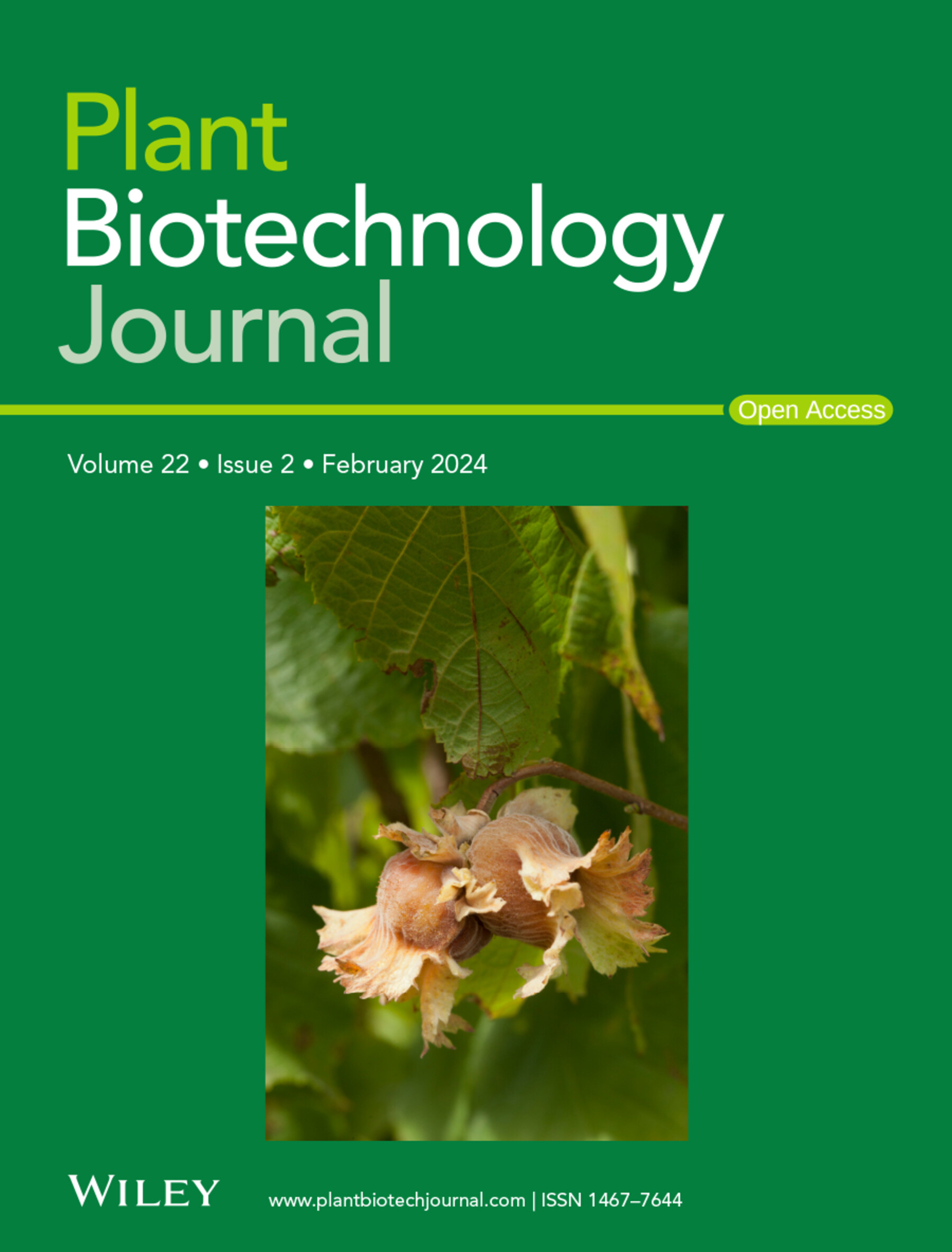合成多倍体通过重塑转录组和增强微生物组增强小麦对镰刀菌的耐受性。
IF 10.5
1区 生物学
Q1 BIOTECHNOLOGY & APPLIED MICROBIOLOGY
引用次数: 0
摘要
多倍体化是提高植物抗逆性和环境适应性的自然进化机制;然而,它对微生物组稳态的影响仍然知之甚少。本研究选育了一株初生整倍体合成六倍体小麦品系(HG116;(2n = 6x = 42, BBAADD)自交Triticum turgidum L. ssp的F1杂种。杜伦(兰登,LDN;2n = 4x = 28, BBAA)和黄斑天牛(Aegilops tauschii)(SY41;2n = 2x = 14, DD)。我们研究了合成多倍体化对根基因表达、根相关微生物组和对小麦镰刀菌耐受性的影响。转录组学分析显示,HG116中的多倍体化主要是上调基因,这些基因在应激和防御相关途径中富集,特别是那些参与对病原体和生物应激的反应的基因。微生物组分析表明,与亲本系相比,HG116在根际和根内圈招募了有益细菌类群,抑制了潜在真菌病原体的生长。在谷草假丝酵母接种试验中,HG116表现出与抗谷草假丝酵母品种相当的耐受性,与其敏感亲本品种形成对比。此外,HG116通过富集革兰氏阳性菌如放线菌门和厚壁菌门来维持微生物稳态。F. graminearum的接种也引发了HG116中广泛的转录重编程,包括脱氢酶、通用应激蛋白和防御相关基因的上调,这些基因可能共同促进了F. graminearum的耐受性。这些发现支持了一种可能性,即合成多倍体化可以通过重塑转录组和微生物网络来增强小麦对小麦赤霉病的耐受性,为开发更具抗逆性的小麦品种提供了有价值的见解。本文章由计算机程序翻译,如有差异,请以英文原文为准。
Synthetic Polyploidisation Enhances Fusarium graminearum Tolerance in Wheat by Reshaping the Transcriptome and Strengthening the Microbiome.
Polyploidisation is a natural evolutionary mechanism that enhances plant stress tolerance and environmental adaptability; however, its impact on microbiome homeostasis remains poorly understood. In this study, we selected a nascent euploid synthetic hexaploid wheat line (HG116; 2n = 6x = 42, BBAADD) by selfing a triploid F1 hybrid of Triticum turgidum L. ssp. durum (Langdon, LDN; 2n = 4x = 28, BBAA) and Aegilops tauschii Coss. (SY41; 2n = 2x = 14, DD). We investigated the effects of synthetic polyploidisation on gene expression in roots, the root-associated microbiome and tolerance to Fusarium graminearum. Transcriptomic analysis revealed that polyploidisation in HG116 predominantly upregulated genes, which were enriched in stress- and defence-related pathways, particularly those involved in responses to pathogens and biotic stress. Microbiome profiling showed that HG116 recruited beneficial bacterial taxa and suppressed potential fungal pathogen growth in its rhizosphere and root endosphere compared to its parental lines. In F. graminearum inoculation experiments, HG116 demonstrated tolerance comparable to that of the F. graminearum-resistant variety, in contrast to its susceptible parental varieties. Moreover, HG116 maintained microbial homeostasis by enriching Gram-positive bacteria such as Actinobacteria and Firmicutes. F. graminearum inoculation also triggered extensive transcriptional reprogramming in HG116, including the upregulation of dehydrin, universal stress protein and defence-related genes, which might collectively contribute to F. graminearum tolerance. These findings support the possibility that synthetic polyploidisation could enhance wheat's tolerance to F. graminearum by reshaping transcriptomic and microbial networks, offering valuable insights for developing more resilient wheat cultivars.
求助全文
通过发布文献求助,成功后即可免费获取论文全文。
去求助
来源期刊

Plant Biotechnology Journal
生物-生物工程与应用微生物
CiteScore
20.50
自引率
2.90%
发文量
201
审稿时长
1 months
期刊介绍:
Plant Biotechnology Journal aspires to publish original research and insightful reviews of high impact, authored by prominent researchers in applied plant science. The journal places a special emphasis on molecular plant sciences and their practical applications through plant biotechnology. Our goal is to establish a platform for showcasing significant advances in the field, encompassing curiosity-driven studies with potential applications, strategic research in plant biotechnology, scientific analysis of crucial issues for the beneficial utilization of plant sciences, and assessments of the performance of plant biotechnology products in practical applications.
 求助内容:
求助内容: 应助结果提醒方式:
应助结果提醒方式:


